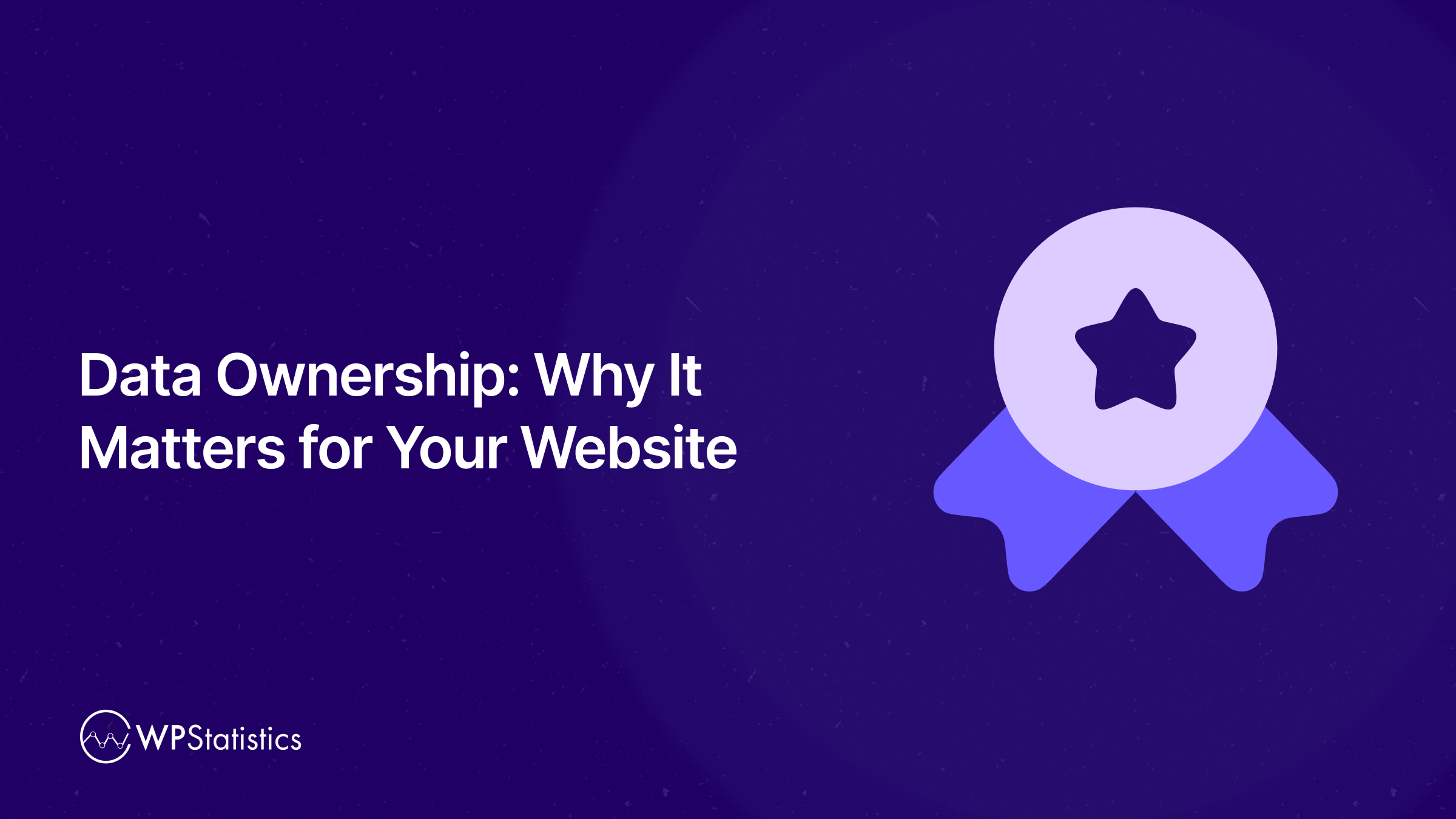Do you pay attention to website data ownership?
Website owners have to use a web analytics tool to track the performance of their site. The problem is that you don’t know where third-party analytics tools store your data, and many times, you don’t have access to your data.
These tools collect and store highly personal data, and this has raised privacy concerns among internet users and governments. As a result, self-hosted analytics and data ownership have become a trend in recent years.
In this blog post, we’ll discuss the importance of owning your data and introduce the best first-party analytics tools for data ownership.
What Is Website Data Ownership?
Data ownership is the ability to control, access, and manage the data on your website. The website data includes user interactions, website traffic, sales data, and other analytics.
In other words, data ownership means that YOU decide how your data is collected, stored, and used, not third-party tools.
Website data ownership is important from different perspectives, including:
- Privacy: Users have the right to control their personal information.
- Monetization: Companies should not make a profit from users’ data.
- Security: Ownership ensures accountability for protecting data.
- Transparency: Users should know who owns website data and how they use the data.
So, if you want to have a trusted website, you must think of a way to own its data and avoid sharing it with third-party tools.
Here are the benefits of data ownership for businesses:
- Control over data
- Easier compliance
- Greater customer trust
- Freedom from vendor limits
- Customizable analytics
- Smooth system integration
- Unique competitive insights
- Stronger security
Why Website Data Ownership?
If you don’t pay attention to data ownership for your website, you might face serious problems, including:
1. Loss of Customer Trust
Internet users are becoming sensitive to their personal data and the way companies use their information.
If your website uses aggressive tracking methods, like cross-site identifiers, many users will avoid using your website. Please remember that people don’t want to be tracked across various platforms and receive targeted ads anywhere they visit.
So, without a strict data ownership approach, you’ll have lower opt-in rates and higher bounce/unsubscribe.
2. Regulatory Risks
If you want to remain compliant with laws like GDPR and CCPA, you have to handle data responsibly.
Without controlling your website data, regulators can fine your website even if the mistake came from a vendor.
So, you must know exactly where your users’ data is and can act quickly if users or regulators ask questions about their data.
3. Data Loss & Dependency
When you use a third-party tool or a vendor, you may lose years of website history in case they:
- Shut down
- Raise prices
- Delete old records
Without your historical data, you can’t compare growth, track seasonality, or learn from past results. When you rely on a vendor, you must accept anything they want, from changing rules to prices.
So, you must think of owning your website data to reach its past insights without being worried about a continuity gap.
4. Private Data Leakage
Some third-party tools collect highly personal data. Besides, there is always the possibility of data leakage from these tools, which will put your business at risk of losing your users’ personal information. Website data ownership reduces this risk if you store the data on a trusted host.
How to Protect Your Website Data?
Now that you know the importance of data ownership, it’s good to learn how to protect your data from possible risks.
Keep a Copy
If you’re using a third-party tracking tool, try to find a way to store your data in systems you control. For example, store it on your own server, database, or cloud account under your name.
Remember that if all your data remains only on a third-party tool, you’ll be dependent on it. So, keep a copy for yourself so that you can always access it, no matter what happens to it.
Control Who Gets In
Even if you have full control over your data, you should not let everyone on your team access sensitive data.
Remember that accidental deletions, unauthorized changes, or even disgruntled employees can put data at risk.
Try to limit access to the people who truly need it, like your content managers or developers. You also need to review permissions regularly and change the access level if necessary.
Use Secure Connections
You always need to use secure connections (HTTPS, SSL) for your website and databases. This keeps your data encrypted when you send or receive it, and hackers can’t easily snoop or tamper with it.
Back Up Regularly
Even the safest servers might crash. So, you have to think of a reliable backup strategy to secure your data.
Automatic backups are your safety net that stores your data somewhere separate to save it. You need to test restoration to make sure everything works well.
Collect Only What You Need
More data isn’t always better. If you store unnecessary data, you just add risks. This is particularly important when it comes to highly personal details, like full names or birthdays.
If a breach happens in your system, the less sensitive information you have on your server, the less damage it causes.
Choose Privacy-First Tools
Third-party analytics tools collect highly personal details and track users across the web. They also store the data on servers that might be located outside your country or continent. So, you have to think of another way if you respect data ownership.
Fortunately, there are lots of privacy-focused solutions that help you have more control over your data. Try to shift from third-party tools to these to make your website compliant and improve its data privacy.
The Best Privacy-First Website Analytics Tools for Data Ownership
If you’re looking for a solution that lets you own your data, you must go for privacy-focused web analytics tools.
Here are some of the best privacy-first tools that are great for data ownership:
1. WP Statistics
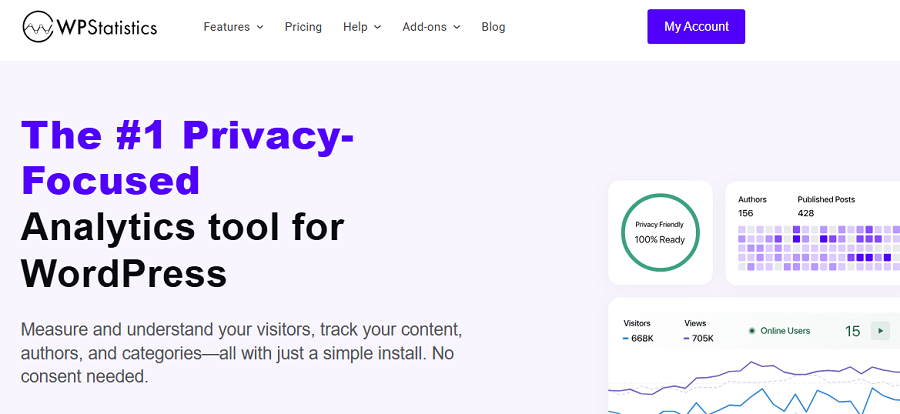
The best analytics solution for WordPress sites is WP Statistics. It lets you keep all analytics data within your own WordPress database.
This means that your website’s visitor information will not be shared with any third-party servers for monetization or other purposes.
It’s GDPR-compliant by default and allows you to enable/disable PII collection and cookies. WP Statistics is easy to set up, making it a great option for beginners and those who are not comfortable with Google Analytics.
It’s as accurate as GA4 and provides clear reports on traffic, pages, and user activity without relying on tracking cookies.

Additionally, it tracks some metrics that GA4 doesn’t provide. For example, you can track the performance of your website authors using its Author Analytics feature.
Single-page analytics, UTM tracking, and integration with Google Search Console are also among its useful features.
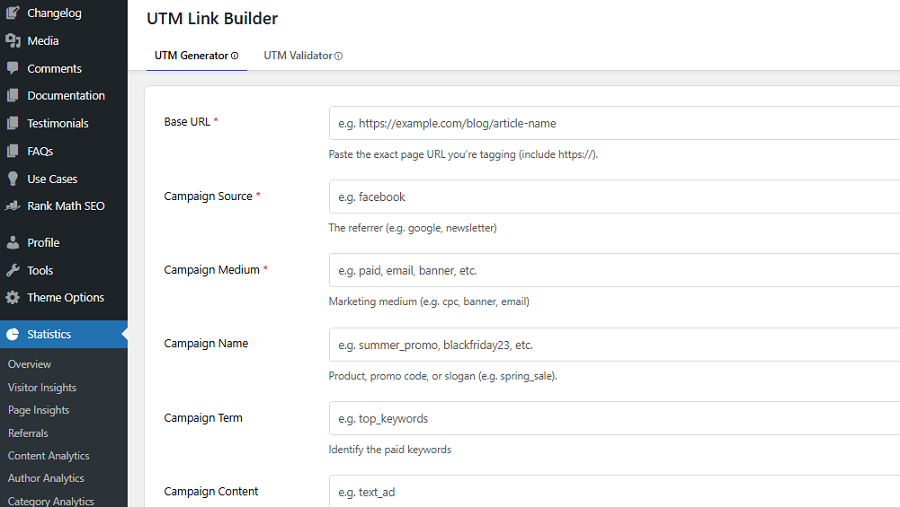
2. Matomo
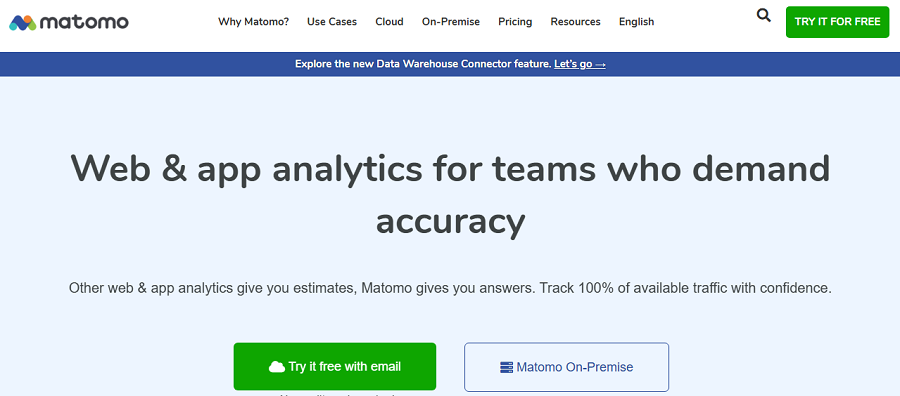
Matomo offers a flexible model for hosting and data ownership: On-Premise (self-hosted) or Cloud-hosted services.
In the first option, you can self-host it on your own servers for complete ownership and control.
The second option allows you to choose a paid cloud service if you prefer managed hosting.
When you choose the self-hosted option, you fully own the raw data, reports, and tracking logs. That’s why Matomo has become one of the best choices for organizations with strict data protection requirements.
No matter what type of ownership you choose, Matomo provides enterprise-level analytics features, such as heatmaps, funnels, and A/B testing.
3. Plausible Analytics
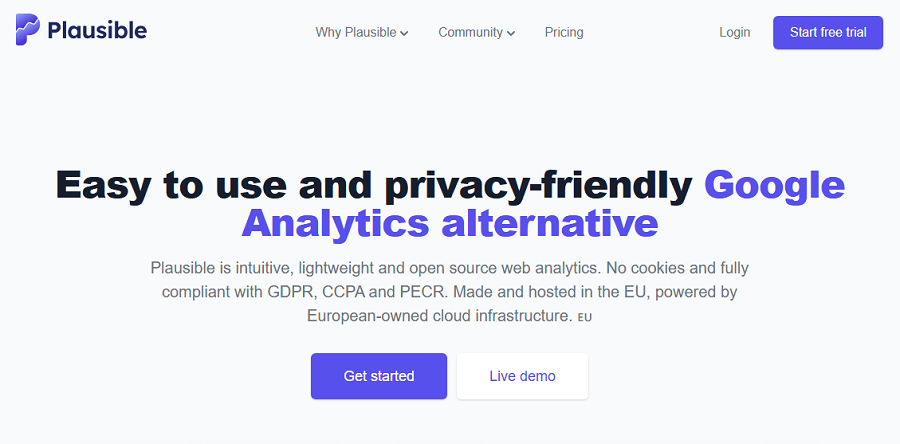
Plausible is an open-source analytics platform that can be installed on your own server. You can choose the self-hosted feature to be the owner of all traffic data, without dependency on external providers.
The good news is that if you choose their cloud service, data is kept and managed on EU-based servers. So, your website still remains compliant with European privacy laws.
They never sell or share your data, which makes Plausible a favorite among developers and small businesses. You can’t find any other minimal analytics tool with such ownership level.
4. Fathom Analytics
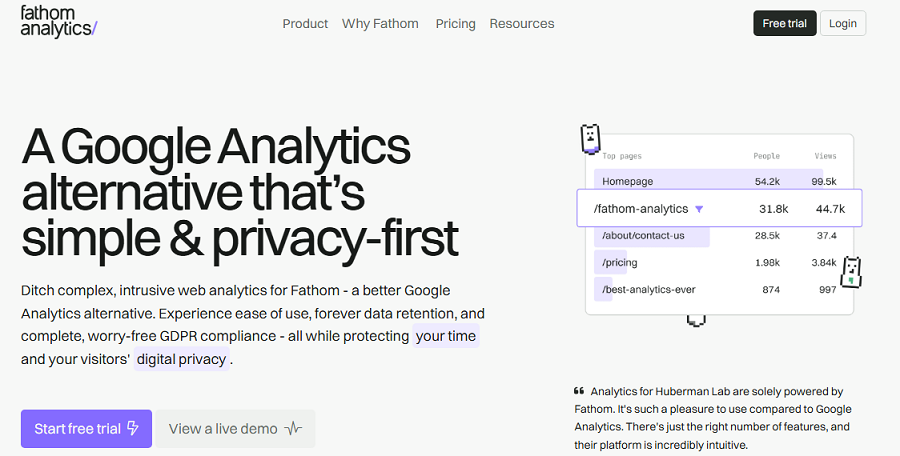
Fathom offers a hybrid approach in terms of data ownership. Its current version is mainly a paid hosted service, which means Fathom controls the infrastructure with limited data ownership. However, it promises never to sell or misuse your data.
Additionally, if you want total control, you can go for its older open-source version called Fathom Lite.
Remember that this version is not actively supported, but it’s still a great self-hosting alternative to Google Analytics. As they claim, the Lite version can be hosted anywhere you like, which is a good option for those who want a self-hosted tool without a good budget.
Fathom Lite’s strength is its simplicity, fast, and clean reports that don’t require technical setup.
5. Umami
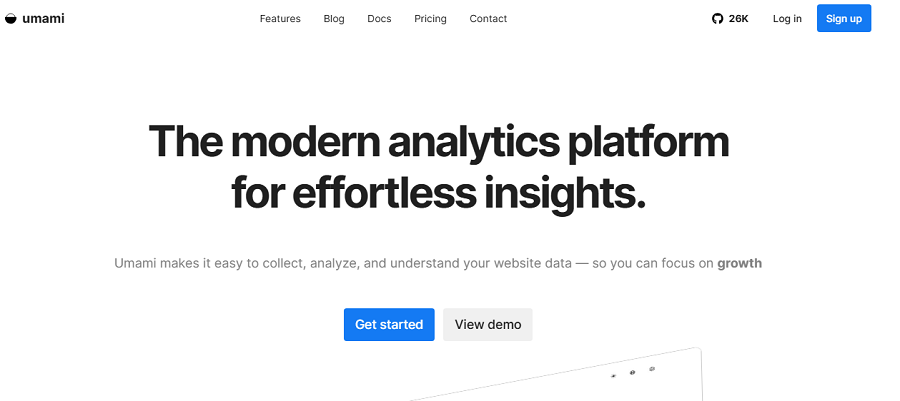
Umami is a 100% open-source analytics platform built for self-hosting. The difference between Umami and other tools is that they only offer a SaaS-first model, while ownership is the default in Umami.
When you use Umami, all tracking logs and visitor information remain under your control. There are no vendor lock-ins, subscriptions, or external storage dependencies.
If you want maximum data ownership along with ease of use, Umami is the best solution for you.
| Tool | Hosting Type | Who Controls Data? |
| WP Statistics | Self-hosted plugin | You, inside your WordPress site |
| Matomo | Self-hosted + cloud | You (self-host) / Matomo (cloud) |
| Plausible | Self-hosted + EU cloud | You (self-host) / Plausible (cloud) |
| Fathom | Paid hosted + old self-hosted | Fathom (hosted) / You (Lite) |
| Umami | Self-hosted | You only |
Final Thoughts
Website data ownership is an essential part of privacy rules around the world.
You must take care of the data collected on your website and the way it’s being used. Third-party tools might collect highly personal information and monetize it.
If you respect your visitors’ data privacy, you’d better choose another way to track your website’s performance.
Privacy-focused analytics tools store data on secure hosts and don’t sell it to other parties. They also avoid collecting PII or using cookies to violate people’s privacy.
The good news is that the accuracy of these tools is as good as Google Analytics.
So, don’t waste your time and go privacy-conscious right now.
FAQs
Do websites sell your data?
Some websites might sell your personal information. Many free platforms, like Google, make money by collecting and selling user data to advertisers. That’s why when you search for a product on Google, you might see relevant ads on other websites.
What does data ownership do?
It gives you control over your website’s data. This way, you can manage how the data is collected, stored, and used. Data ownership protects privacy and makes your website compliant with GDPR and other data protection regulations.
Who determines data ownership?
It’s determined by the person who collects and stores the data. If you host and manage it yourself, you own it.

